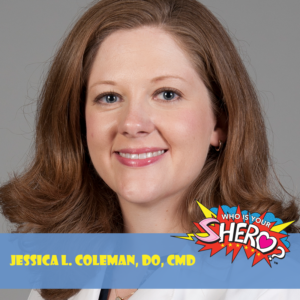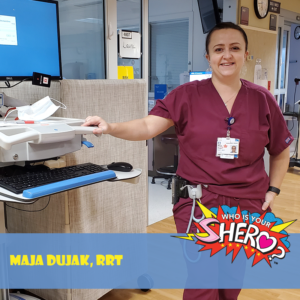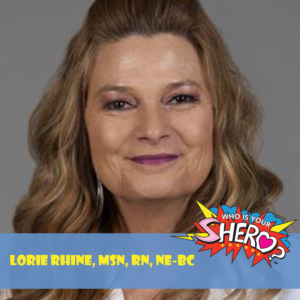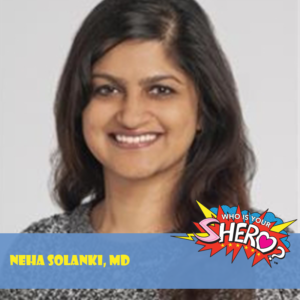SHEro campaign raises more than 47K for COVID-19 Relief

This year, the Women's Endowment Fund raised more than $47,000 during its "Who Is Your SHEro?" campaign. In response to the COVID-19 pandemic, the campaign supported Akron Community Foundation's Community Response Fund for Nonprofits to rapidly provide flexible resources to area nonprofit organizations working on the frontlines of educating, engaging, and supporting individuals impacted by this health crisis, including women and girls.
To learn more about how these frontline workers have been impacted by the current pandemic, the Women's Endowment Fund conducted a Q&A with healthcare SHEroes: Jessica L. Coleman, DO, CMD, medical director, geriatrician, Summa Health; Maja Dujak, RRT, respiratory therapist, Cleveland Clinic Akron General; Lorie Rhine, MSN, RN, NE-BC, vice president and chief nursing officer, Summa Health System; and Neha Solanki, MD, pulmonologist, Cleveland Clinic Akron General.
 SHEro Jessica L. Coleman, DO, CMD,
SHEro Jessica L. Coleman, DO, CMD,
Medical Director, Geriatrician, Summa Health
Q: What attracted you to working in the healthcare profession?
A: I am grateful to come from a long line of health care professionals who have dedicated their lives to the care of overlooked populations. My grandmother, aunt, and mother are all registered nurses and taught me to look at each patient holistically. My father is a family medicine physician who taught me that establishing a personal relationship with a patient or their caregiver can be the most important care provided, and the most fulfilling.
Q: How do you make a positive difference in your role each day?
A: I have the opportunity to work with learners at all levels. My goal is to make a positive difference in the future of medicine by helping to train the next generation of healthcare providers to value our elderly population.
Q: What are the most important traits of successful healthcare leaders during this time of pandemic?
A: During any time of stress for an organization, a successful leader encourages their team to support one another and be open and honest about their fears and stressors. An open dialogue most supports staff, improves communication and makes the team more agile and able to provide appropriate care during rapidly changing times.
Q: What will be the biggest challenge for the next generation of women in the medical profession?
A: The biggest challenge for the next generation of any leader in the medical profession will be to not forget the lessons learned during this pandemic. We have come to find meaning and connection in new ways and care for our patients in a different way. Women in healthcare are uniquely positioned to carry these lessons into the future because of an innate ability to view patients and their caregivers as whole beings outside of their disease-states.
Q: Who is your SHEro and why?
A: My SHero is my grandmother who was a nurse for over 50 years. She worked full time and raised 8 children all while continuing to pursue opportunities to volunteer in her community. Following a partial retirement, she spent her time traveling and volunteering internationally. She taught me to be strong, brave, embrace new challenges and focus on the things that matter.
 SHEro Maja Dujak, RRT
SHEro Maja Dujak, RRT
Respiratory Therapist, Cleveland Clinic Akron General
Q: What attracted you to working in the healthcare profession?
A: I was born and raised in Bosina, and I lived through the civil war in my country. My dad was a medic in the army, so from a very young age I always knew I wanted to help people. Twenty years later, I'm a respiratory therapist at Cleveland Clinic Akron General.
Q: How do you make a positive difference in your role each day?
A: I love to teach and learn from others. I think learning and knowing more is always a positive thing.
Q: What are the most important traits of successful healthcare leaders during this time of pandemic?
A: Teamwork. I always knew we had great people working at our facility and this pandemic has brought us even closer together. This is something I have never seen before and I am proud to be a part of the amazing team we have here at Cleveland Clinic Akron General.
Q: What will be the biggest challenge for the next generation of women in the medical profession?
A: I don't know if there are any challenges for woman in healthcare. I feel like we are equal with our male co-workers at Cleveland Clinic Akron General.
Q: Who is your SHEro and why?
A: My mom and dad for sure. They left everything and everyone to bring my sister and me to this country in search of a better life, more opportunities, and above all, a safer environment. From the bottom of my heart, I want to say "thank you" to them.
 SHEro Lorie Rhine, MSN, RN, NE-BC
SHEro Lorie Rhine, MSN, RN, NE-BC
Vice President and Chief Nursing Officer, Summa Health System
Q: What attracted you to working in the healthcare profession?
A: I lost my sister to an incurable disease when I was 15 and she was 18. My sister and family spent a lot of time at the Cleveland Clinic, I witnessed firsthand what nursing was all about, and the care, compassion and comfort left a lasting impression for the nurse I wanted to become.
Q: How do you make a positive difference in your role each day?
I have been a nurse for 38 years and have loved my journey and career choice. Technologies have changed over the years, however the core beliefs of Florence Nightingale still shape what we do every day. I feel the best way to make a positive difference is through being genuine with staff. I like to be visible and communicate often with them. I still feel energized when I round throughout the hospital, my passion comes from engaging with frontline staff who make a difference every day. I continue to be inspired by the commitment of the nurses I am fortunate to lead. I marvel at their innovation, and recognize that they are influencing the lives of all those who work alongside them or are cared for by them.
Q: What are the most important traits of successful healthcare leaders during this time of pandemic?
A: Staff have a multitude of needs during this time. They are concerned for their safety, the safety of their family, as well as their patients. They are dealing with personal and financial issues while trying to remain focused on the tasks at hand. Our staff have “showed up” for their patients and co-workers during a time of uncertainty and change. I believe the most important thing a healthcare leader can do during this pandemic is to communicate and be visible. I opted to send a daily email communication to all of my nurses with updates regarding the virus, as well as inspirational quotes and pictures of all the community support they received. I also spent time rounding on units with snacks and drinks to give staff the opportunity to converse with me. I listened as they laughed, cried or vented. Behind the scenes, I spent a great deal of time in meetings making decisions on how best to keep them safe and protected from the virus. I told them in my daily communication that their safety was my top priority, and I worked diligently to follow through on that promise.
Q: What will be the biggest challenge for the next generation of women in the medical profession?
A: Staying true to ourselves, do not be afraid to show compassion. It is not a sign of weakness it's called empathy. We need to consistently work with connecting to frontline staff and collaborating with all disciplines
Q: Who is your SHEro and why?
A: Judy Gilliam, former CNO at Ohio University Medical Center, she inspired me to lead with passion and collaboration. She was always positive and interested in developing leaders within and outside of nursing.
 Neha Solanki, MD
Neha Solanki, MD
Pulmonologist, Cleveland Clinic Akron General.
Q: What attracted you to working in the healthcare profession?
A: My mom. I grew up in a lower income background where it was difficult to get any healthcare. Growing up, my mom encouraged me to be a doctor so that I could help people like her—minorities that have sub-optimal life circumstances. When I was a sophomore in college, she suffered a traumatic brain injury after a vehicular accident. She was in the neuro-intensive care unit for several days before ultimately passing away.
I could have walked away from medicine then. It would have been easy to do. Even now, going into a neuro-intensive care unit brings back feelings and memories from that time. I remember the attending physician calling me after I had just left the hospital all those years ago and telling me that my mother would not make it through the night. His voice sounded so harsh and disconnected to me. To him, my mother was just another patient with a poor outcome that was inevitable. It was in the days that followed that I resolved to never be that type of doctor. I wanted to be a doctor that gave comfort in the darkest hour because that is when it is needed most.
So much of medicine is about connection with people that we work with and also with our patients and their families. This connection and community is what attracted me to the field of medicine. I see my job as not just one where I medically treat my patients, but one in which I
empathize with them and their families who are suffering.
Q: How do you make a positive difference in your role each day?
A: My goal is to be kind to everyone I meet. I work in a very high-stress environment, specifically the medical intensive care unit during the COVID-19 pandemic. Emotions run high among everyone, including the families of the patients who are not able to see their loved ones due to the pandemic. It is important for me to recognize that everyone is just doing her best and that “best” varies from moment to moment.
Q: What are the most important traits of successful healthcare leaders during this time of pandemic?
A: The most important trait of a successful healthcare leader during this time of pandemic is leading by example, followed closely by patience and being a good listener. Do the things that we are asking everyone else to do: wear masks, social distance, take care of patients in appropriate personal protective equipment (PPE). Patience in listening is also powerful. The time taken to hear what someone has to say -- either or a coworker or a patient or a family member-- can sometimes make all the difference.
I also think it's important to demonstrate vulnerability. Honesty and trust are rooted in vulnerability. That is how people connect and how people listen to and follow advice.
Q: What will be the biggest challenge for the next generation of women in the medical profession?
A: Women tend to not self-advocate, and we can oftentimes be looked over. Our softness can be mistaken for weakness. But just because we may be quieter, doesn't mean that we are weaker. It just means that we have a different but no less powerful style of leading and of being.
I think the biggest challenge for women is the realization that we have the power within us to be assertive. We must find who our allies are and find strength in our allies and keep pushing forward.
Q: Who is your SHEro and why?
A: My SHEro is Dr. Karen DeSalvo, who is an alumna of Tulane University where we both did our medical school training. When I met her, she was the health commissioner of the city of New Orleans. She did so much for New Orleans in the wake of Hurricane Katrina and was a leader in re-engineering healthcare in Louisiana. She has gone on to become a nationally recognized health policy leader working at the intersection of medicine, public health, and information technology. It is inspiring to have a role model who is a woman in medicine.
She felt strongly about a cause and she made a difference. I strive for that as well.
